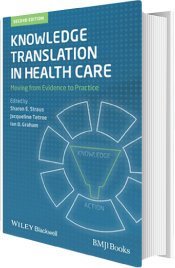CIHR has compiled a series of PowerPoint presentations that were prepared by the authors of this publication, based on the chapter(s) that they wrote. The content in these slides is meant to complement, rather than to replace the original chapters. We invite you to use these slides for your learning and/or training activities. If you would like additional information on the content of the slides, please refer to the Knowledge Translation in Health Care book.
Please note that these presentations are based on the first editions of this publication.
Section 1: Introduction
- Knowledge-to-action: what it is and what it isn’t
(Sharon E. Straus, Jacqueline Tetroe, Ian D. Graham)
Section 2: Knowledge Creation
- 2.1 The K in KT: knowledge creation
(Sharon E. Straus) - 2.2 Knowledge synthesis
(Jennifer Tetzlaff, Andrea C. Tricco, David Moher) - 2.3 Knowledge translation tools
(Melissa C. Brouwers, Dawn Stacey, Annette M. O’Connor) - 2.4 Searching for research findings and KT literature
(K. Ann McKibbon, Cynthia Lokker)
Section 3: The Knowledge-to-Action Cycle
- 3.1 The action cycle
(Sharon E. Straus) - 3.2 Identifying the knowledge-to-action gaps
(Alison Kitson, Sharon E. Straus) - 3.3 Adapting knowledge to a local context
(Margaret B. Harrison, Ian D. Graham, Beatrice Fervers) - 3.4 Assessing barriers and facilitators to knowledge use
(France Légaré) - 3.5 Selecting KT interventions
- 3.5.1 Selecting, tailoring and implementing knowledge translation interventions
(Michel Wensing, Marije Bosch, Richard Grol) - 3.5.2 Educational interventions
(Dave Davis, Nancy Davis) - 3.5.3 Linkage and exchange interventions
(Martin P. Eccles, Robbie Foy) - 3.5.4 Audit and feedback interventions
(Robbie Foy, Martin P. Eccles) - 3.5.5 Informatics interventions
(Samir Gupta, K. Ann McKibbon) - 3.5.6 Patient-mediated interventions
(Annette M. O’Connor) - 3.5.7 Organizational interventions
(Ewan Ferlie)
- 3.5.1 Selecting, tailoring and implementing knowledge translation interventions
- 3.6 Monitoring and evaluating knowledge
- 3.6.1 Monitoring knowledge use and evaluating outcomes of knowledge use
(Sharon E. Straus, Jacqueline Tetroe, Ian D. Graham, Merrick Zwarenstein, Onil Bhattacharyya) - 3.6.2 Framework for evaluating complex interventions
(Sasha Shepperd)
- 3.6.1 Monitoring knowledge use and evaluating outcomes of knowledge use
- 3.7 Sustaining knowledge use
(Barbara Davies, Nancy Edwards) - 3.8 Case examples
(Sumit R. Majumdar)
Section 4: Theories and Models of Knowledge-to-Action
- 4.1 Planned action theories
(Ian D. Graham, Jacqueline Tetroe, KT Theories Group) - 4.2 Cognitive psychology theories of change
(Alison Hutchinson, Carole A. Estabrooks) - 4.3 Educational theories
(Alison Hutchinson, Carole A. Estabrooks) - 4.4 Organizational theory
(Jean-Louis Denis, Pascale Lehoux) - 4.5 Quality improvement
(Anne Sales)
Section 5: Knowledge Exchange
- 5.1 Knowledge dissemination and exchange of knowledge
(Michelle Gagnon)
Section 6: Evaluation of Knowledge-to-Action
- 6.1 Methodologies to evaluate effectiveness of knowledge translation interventions
(Onil Bhattacharyya, Merrick Zwarenstein) - 6.2 Economic evaluation of knowledge-to-action interventions
(Deborah J. Kenny, Evelyn Cornelissen, Craig Mitton)
Appendixes
- Approaches to measurement
(Robert Parent) - Knowledge management and commercialization
(Réjean Landry) - Ethics in knowledge translation
(Burleigh Trevor-Deutsch, Kristiann Allen, Vardit Ravitsky)

